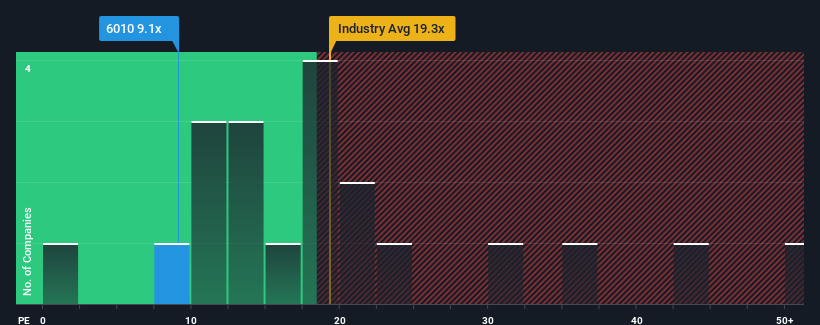- Saudi Arabia
- /
- Food
- /
- SASE:6010
The Market Doesn't Like What It Sees From The National Agricultural Development Company's (TADAWUL:6010) Earnings Yet

With a price-to-earnings (or "P/E") ratio of 9.1x The National Agricultural Development Company (TADAWUL:6010) may be sending very bullish signals at the moment, given that almost half of all companies in Saudi Arabia have P/E ratios greater than 23x and even P/E's higher than 40x are not unusual. However, the P/E might be quite low for a reason and it requires further investigation to determine if it's justified.
With earnings growth that's superior to most other companies of late, National Agricultural Development has been doing relatively well. It might be that many expect the strong earnings performance to degrade substantially, which has repressed the P/E. If not, then existing shareholders have reason to be quite optimistic about the future direction of the share price.
View our latest analysis for National Agricultural Development

How Is National Agricultural Development's Growth Trending?
There's an inherent assumption that a company should far underperform the market for P/E ratios like National Agricultural Development's to be considered reasonable.
Taking a look back first, we see that the company grew earnings per share by an impressive 45% last year. Although, its longer-term performance hasn't been as strong with three-year EPS growth being relatively non-existent overall. Accordingly, shareholders probably wouldn't have been overly satisfied with the unstable medium-term growth rates.
Looking ahead now, EPS is anticipated to slump, contracting by 11% per year during the coming three years according to the three analysts following the company. With the market predicted to deliver 13% growth each year, that's a disappointing outcome.
With this information, we are not surprised that National Agricultural Development is trading at a P/E lower than the market. However, shrinking earnings are unlikely to lead to a stable P/E over the longer term. There's potential for the P/E to fall to even lower levels if the company doesn't improve its profitability.
The Bottom Line On National Agricultural Development's P/E
We'd say the price-to-earnings ratio's power isn't primarily as a valuation instrument but rather to gauge current investor sentiment and future expectations.
As we suspected, our examination of National Agricultural Development's analyst forecasts revealed that its outlook for shrinking earnings is contributing to its low P/E. Right now shareholders are accepting the low P/E as they concede future earnings probably won't provide any pleasant surprises. It's hard to see the share price rising strongly in the near future under these circumstances.
It is also worth noting that we have found 2 warning signs for National Agricultural Development (1 shouldn't be ignored!) that you need to take into consideration.
You might be able to find a better investment than National Agricultural Development. If you want a selection of possible candidates, check out this free list of interesting companies that trade on a low P/E (but have proven they can grow earnings).
If you're looking to trade National Agricultural Development, open an account with the lowest-cost platform trusted by professionals, Interactive Brokers.
With clients in over 200 countries and territories, and access to 160 markets, IBKR lets you trade stocks, options, futures, forex, bonds and funds from a single integrated account.
Enjoy no hidden fees, no account minimums, and FX conversion rates as low as 0.03%, far better than what most brokers offer.
Sponsored ContentValuation is complex, but we're here to simplify it.
Discover if National Agricultural Development might be undervalued or overvalued with our detailed analysis, featuring fair value estimates, potential risks, dividends, insider trades, and its financial condition.
Access Free AnalysisHave feedback on this article? Concerned about the content? Get in touch with us directly. Alternatively, email editorial-team (at) simplywallst.com.
This article by Simply Wall St is general in nature. We provide commentary based on historical data and analyst forecasts only using an unbiased methodology and our articles are not intended to be financial advice. It does not constitute a recommendation to buy or sell any stock, and does not take account of your objectives, or your financial situation. We aim to bring you long-term focused analysis driven by fundamental data. Note that our analysis may not factor in the latest price-sensitive company announcements or qualitative material. Simply Wall St has no position in any stocks mentioned.
About SASE:6010
National Agricultural Development
Engages in production of agricultural and livestock products in the Kingdom of Saudi Arabia and internationally.
Flawless balance sheet and good value.
Similar Companies
Market Insights
Community Narratives



